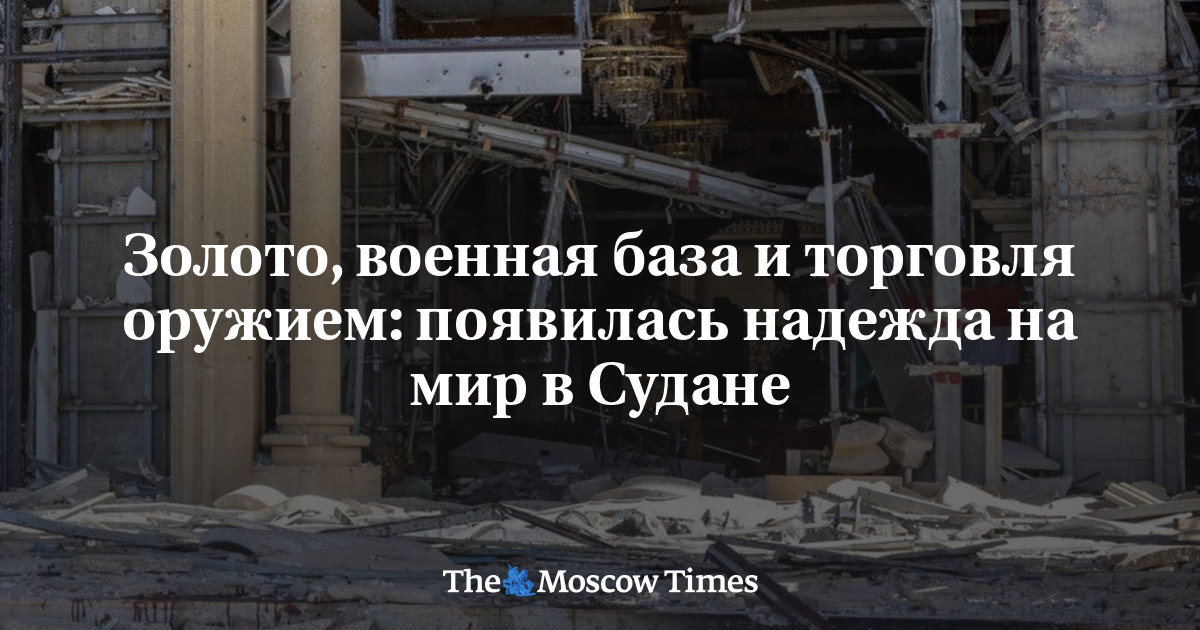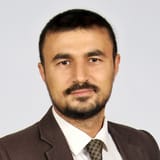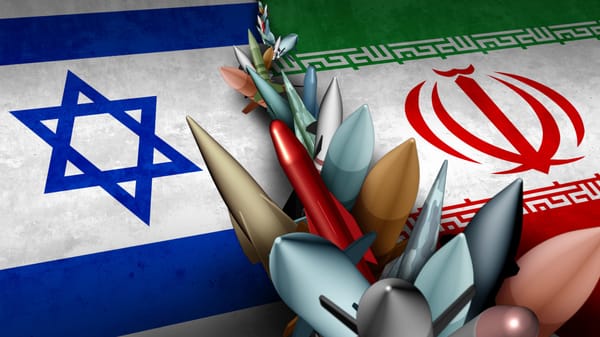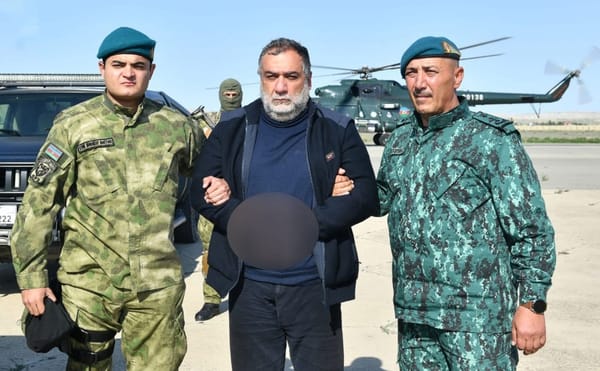3G — Gold, Guns, and Geopolitics: Is There Still Hope for Peace in Sudan?

Two years after the onset of civil war, Sudan finds itself on the brink of decisive changes. Recently, the government army finally managed to expel units of the paramilitary Rapid Support Forces from the country's key cities, including the capital Khartoum. However, this military success is already being accompanied by increased external intervention. Neighboring states and major global powers are actively engaging in Sudan's internal confrontation, pursuing their own political and economic interests.
Sudan's capital, once-sunny Khartoum, lies in ruins. However, the national flag once again flies over the semi-destroyed presidential palace. The protracted rivalry between Sudan’s two most influential generals—the army commander Abdel Fattah al-Burhan and Rapid Support Forces leader Mohamed Hamdan Dagalo (better known as Hemedti)—has reached its decisive phase. After fierce battles and with active support from foreign allies, government forces managed to push Hemedti’s fighters out of central Khartoum.
However, the cost of this victory has proven disastrously high. Major cities across the country have become zones of relentless combat. Millions of residents have been forced to flee their homes, and the humanitarian catastrophe in Sudan, despite all the government's military victories, continues to escalate rapidly, drawing neighboring countries and the international community deeper into the vortex of Sudan's civil war.
Desert Storm Around Khartoum
Only recently, following the overthrow of dictator Omar al-Bashir in 2019, Sudan was perceived as one of the pillars of stability in the Horn of Africa. The country's strategic location and substantial resources attracted global powers' attention. However, in April 2023, Khartoum echoed with the first explosions of the civil war, which has continued ever since—sudden clashes erupted between the regular Sudanese army under General Abdel Fattah al-Burhan and the paramilitary Rapid Support Forces (RSF), commanded by General Mohamed Hamdan Dagalo, widely known as "Hemedti."
As Africa’s third-largest country, Sudan shares borders with seven states. The rupture and chaos at such a strategic crossroads immediately triggered a chain reaction throughout the region. In the initial months of the conflict, thousands of refugees streamed across Sudan's borders into Egypt, Chad, the Central African Republic, South Sudan, and Ethiopia.
During the war's early stages, the situation favored Hemedti’s forces. Using the element of surprise and pre-positioned urban units, the RSF swiftly seized control over large parts of Khartoum and other major cities. The regular army was caught off guard. General Burhan had to withdraw to strategic sites and military bases, surrendering entire city districts to militants. The legitimate government appeared doomed.
By late 2023, however, the situation began shifting, albeit slowly. The army regrouped and received reinforcements and new weaponry from abroad—primarily combat drones. Among the main unofficial suppliers were Iran and Russia. The strategy of aerial strikes proved effective. Drones and aircraft systematically destroyed rebel ammunition depots and convoys. Iranian reconnaissance and attack drones, along with other unmanned systems, deprived the RSF of their primary advantage—mobility. Although Hemedti’s fighters also began using commercial drones and deployed anti-aircraft defenses against government forces, their resources proved significantly smaller.
By early 2025, the initiative had fully shifted to the regular army. The culmination was the recent storming of central Khartoum. Government troops expelled rebels from the presidential palace and key administrative buildings. It was both a symbolic and strategic victory, marking the effective defeat of the RSF as an organized force. Nevertheless, scattered RSF units refused to surrender and retreated to the periphery, resorting to guerrilla tactics. Even after losing the palace, insurgents managed to inflict painful blows to the army—for instance, attacking the capital’s television center with a kamikaze drone. Clearly, the war has now entered a qualitatively new phase: this time the regular army is gaining the upper hand, though the fight against remaining pockets of resistance is still far from over.
Meanwhile, Khartoum itself has become an extensive humanitarian catastrophe zone. Residential neighborhoods lie in ruins, and city infrastructure is almost entirely paralyzed. Millions fled, escaping airstrikes and street shootings. Those remaining in the capital struggle without water or electricity, constantly threatened by crossfire.
Equally horrifying tragedies unfold in the western province of Darfur, where the army is now pushing back the RSF. Reports from major towns like El Geneina and Nyala detail mass killings committed by Hemedti's forces. The violence often assumes ethnic dimensions, painfully echoing the grim genocide committed by Arab militias against the African population in the early 2000s. Burned villages, thousands displaced, and brutal murders of black Africans have again become daily realities for Darfur’s inhabitants.
Currently, the number of internally displaced persons (IDPs) has reached 14 million—more than a third of the country's entire population. Over three million more have fled Sudan entirely, primarily to neighboring Chad and Egypt. The United Nations describes the situation as the largest humanitarian crisis of our time. Both sides are accused of widespread war crimes: the army for employing air and artillery strikes within residential areas, and the RSF for mass violent crimes and atrocities against civilians. Thus, for tens of millions of ordinary Sudanese, this conflict has turned into an endless nightmare.
From Queens to Pawns
This civil war has another, less obvious consequence. Behind the two Sudanese generals battling each other, a chain of external players has emerged, whose money, weapons, and diplomatic efforts invisibly steer the course of events. Over the past two years, their internal conflict has become an arena of global and regional interests, effectively turning both generals into pawns manipulated by more influential external players.
The role of Russia particularly stands out for its highly destructive nature. Even before the conflict erupted, Moscow cynically cultivated relationships with both Burhan and Hemedti to maintain its foothold in Africa. The Russian mercenary group Wagner had established itself in Sudan during the rule of the ousted dictator al-Bashir, controlling gold mining operations and training RSF fighters. In exchange for gold, Wagner-linked entities supplied Hemedti with weapons, openly signaling their support for his side. However, simultaneously, the Kremlin maintained ties and cooperated with the regular army, notably blocking sharp resolutions against al-Burhan’s regime at the UN Security Council. Russia’s main goal was to retain influence regardless of the war’s outcome and to ensure the loyalty of whatever Sudanese authority survived the conflict, paving the way for strategic plans, including military presence on the Red Sea.
The United States and Western nations, by contrast, emphasized diplomatic pressure. From the outset, Washington condemned the insurgents' actions and called for an immediate ceasefire. Together with Saudi Arabia, the US facilitated negotiations in Jeddah aimed at halting the bloodshed and imposed sanctions on companies linked to the RSF, thereby cutting off financial streams to Hemedti. America's interests are crystal clear: firstly, preventing Sudan from becoming a stronghold for Russian or other hostile forces; secondly, averting a major humanitarian disaster in a densely populated African region to avoid triggering another migration crisis; thirdly, maintaining Sudan as a critical link in regional security stretching from the Horn of Africa to the Middle East.
Regional powers also actively pursue their agendas on the Sudanese chessboard. Egypt, Sudan’s northern neighbor, historically views Khartoum as an essential element of its southern security buffer. For Cairo, it is critical who holds power next door, as this directly impacts Egyptian border security and control over Nile waters. Thus, Egypt’s president Abdel Fattah el-Sisi supported the official Sudanese government under General al-Burhan from day one. Egyptian military trainers and pilots had long cooperated with the Sudanese army, and following the onset of active hostilities, Egypt reportedly provided the Sudanese military with spare parts for aircraft and ammunition.
Early in the conflict, several dozen Egyptian soldiers were captured by the RSF at Merowe airbase, clearly indicating Egypt’s deep involvement. Cairo immediately demanded their release and, upon securing their return, continued providing discreet military assistance to Khartoum. Hemedti posed an additional risk for Egypt: during the dispute over Ethiopia’s dam on the Nile—which threatened to reduce Nile water levels (a critical issue for Egypt)—he sought rapprochement with Addis Ababa, whereas Sudan’s official government aligned with Cairo. Therefore, Egypt sees the government army’s victory as removing a strategic threat along its southern flank.
The wealthy Persian Gulf monarchies—Saudi Arabia and the UAE—also actively pursue their interests in Sudan. The Emirates have historically maintained close cooperation with Hemedti. Thousands of his fighters participated in the Yemen campaign alongside the Saudi-Emirati coalition, and the general’s family managed its gold business through Dubai. According to some reports, even before the war, the UAE supplied the RSF with funds and equipment, expecting loyalty in return. After the conflict erupted, Abu Dhabi formally declared neutrality and called for peace talks, but observers documented cargo flights from parts of Libya controlled by Emirati ally Marshal Khalifa Haftar landing at RSF-held airfields. Clearly, the Libyan marshal could deliver nothing but weapons and ammunition to Sudanese rebels.
Unlike the Emirates, Saudi Arabia seeks a mediator’s role, prioritizing regional stability along the Red Sea coast. Together with the US, Riyadh actively supports intra-Sudanese negotiations in Jeddah, striving for ceasefires and mitigating the humanitarian crisis. Although a lasting peace remains elusive, the Saudis continue humanitarian assistance to Sudan and likely exert significant influence over al-Burhan, promising post-war reconstruction financial aid contingent on preserving national unity under his leadership.
Thus, after two years of civil war, Sudan has become akin to a global chessboard where multiple major geopolitical players maneuver and exchange local Sudanese "pawns." This dynamic considerably complicates conflict resolution, as any advantage gained by one faction immediately affects external interests, hindering international unity in efforts to stop the bloodshed.
Gold in Flames
Beyond political power, control over Sudan's natural resources—primarily gold—has become a major driver of the ongoing war. Sudan ranks among Africa's largest gold producers, annually extracting, according to various estimates, dozens of tons. For a nation struggling with chronic economic instability, this is an enormous asset capable of dramatically shifting the balance of power.
Before the conflict erupted openly, a significant portion of gold mines was under the control of businesses associated with General Hemedti’s family, supported by the Russian mercenary group Wagner. In Darfur—particularly at the famous Jebel Amer mine—companies linked to Hemedti’s relatives actively conducted mining, often selling extracted gold bypassing the state treasury. Because Sudan was under sanctions and former president al-Bashir was indicted by the International Criminal Court for genocide against African populations in Darfur, gold was smuggled out of Sudan and sold via trading hubs in Arab Gulf countries (mainly the UAE), generating substantial revenues for RSF leaders. These funds accumulated in overseas accounts and later transformed into political influence and weaponry.
Once the war began, gold quickly became the primary source of financial stability for the Rapid Support Forces (RSF). With uninterrupted access to gold reserves, Hemedti could finance the loyalty of his fighters and purchase necessary weapons even amid international isolation. He literally turned Darfur's gold into the main currency of the war. Eyewitnesses reported regular flights carrying tons of gold bars departing from RSF-controlled areas at the height of the fighting. Thus, control over gold mining became a strategic objective for both sides. Government forces aimed to cut Hemedti off from the mines, launching offensives specifically targeting states rich in gold deposits and attempting to disrupt smuggling routes. The RSF, in turn, sought at all costs to retain the gold-rich regions of Darfur, even when facing significant setbacks elsewhere.
Naturally, Sudanese gold attracted not only local factions but external players as well. For Russia, currently under intense sanctions pressure, Sudanese gold reserves became a highly desirable asset. Numerous investigative reports revealed that entities affiliated with Wagner actively exported tons of gold from Sudan in exchange for weapons and technical support to Hemedti’s forces.
The “weapons-for-gold” scheme is far from new; it recalls numerous Cold War episodes when the superpowers employed similar methods in Africa. Today in Sudan, this strategy has reemerged, allowing Hemedti not only to fund his army but also secure backing from influential foreign partners. Gulf monarchies, especially the UAE, also display considerable interest in Sudanese gold, viewing it primarily as a commercial venture and an opportunity to strengthen their economic influence in the region.
For a fuller perspective, it is essential to mention that this conflict affects more than gold alone. Since hostilities broke out, Sudan's oil sector has been virtually frozen. Although major oil reserves remained in South Sudan after its independence in 2011, much of the infrastructure for hydrocarbon transportation and refining still lies within Sudanese territory. Military operations pose a significant threat to pipelines and ports, causing unease among global oil market participants.
The fate of Sudan's fertile agricultural lands, which attracted substantial investment during peacetime—such as fields rented by Saudi Arabia for crop cultivation—is also highly uncertain. Other resources are similarly at risk, from gum arabic production to the Nile’s water reserves.
Nevertheless, gold continues to be the primary lifeline sustaining the ongoing battles. As long as both factions perceive opportunities to access gold mines, they retain strong incentives to continue the conflict, determined to deny control of this precious resource to their adversary.
Will Port Sudan Become a New Port Arthur?
Let's not forget that Sudan is not only about gold or the fertile banks of the Nile; it also offers strategic access to the Red Sea, turning a local civil war into a critical piece of a larger geopolitical puzzle. The Red Sea is a crucial global maritime corridor linking the Mediterranean with Asia. Thousands of ships transporting oil, consumer goods, and military cargo pass through it annually, making control over this route historically contested by major powers.
Russia has shown particular interest in Sudan’s coastline. In the final years of Omar al-Bashir's rule, Moscow signed a preliminary agreement to establish a Russian naval base in Port Sudan. According to the initial terms, Russia could station up to 300 military personnel and dock up to four naval vessels, including nuclear-powered ships. This would grant the Russian Navy a long-awaited foothold in the region—for the first time since the Cold War when the USSR maintained a military base on Socotra Island, located between South Yemen and Somalia.
In return, Khartoum expected Russian military equipment and technical support to modernize its armed forces. However, after Bashir's removal in 2019 and subsequent political upheavals, the project stalled. Nevertheless, until the outbreak of the current conflict, negotiations between Moscow and Sudan's new military leadership—the al-Burhan government—continued, culminating successfully last February. This clearly indicates that Moscow has ultimately chosen its side. If Hemedti were to unexpectedly emerge victorious in the civil war, Russia would find itself in a challenging position regarding its base in Port Sudan, as agreements were already publicly reached with his rival.
However, it’s worth recalling that many Arab countries oppose foreign bases on their shores—particularly when it involves a state like Russia, perceived as an outsider in the Middle Eastern region. Egypt, Saudi Arabia, and even Israel (which also values Sudan's stability following normalization in 2020) have clearly signaled they would support Khartoum if it refrains from hosting foreign military installations.
Yet the strategic allure of Port Sudan is so significant that, in the long term, the struggle for control over it will undoubtedly continue. Besides its military dimension, the port and surrounding coastal areas represent an important economic prize. Wealthy Gulf states were actively exploring infrastructure investments, modernization of port facilities, and terminal expansions in Sudan before the conflict erupted. Companies from the UAE, for instance, had signed preliminary agreements to develop Sudan’s largest port. Understandably, these projects are now frozen. Nevertheless, it's evident that once the war concludes, regardless of who holds power, Sudan’s coastline will remain economically and politically attractive. Thus, despite seemingly securing its base in Port Sudan, Russia may still face considerable challenges ahead.
Sudan at a Turning Point
When the dust of battle settles, a crucial question will emerge: what lies ahead for Sudan? Although the regular army is currently celebrating a string of successes and the Rapid Support Forces (RSF) continue to suffer defeats, it is still too early to speak of the war’s end. General Hemedti, having lost the capital, still controls significant territories and commands loyal armed forces in Darfur and other remote regions. His fighters remain well-armed, driven by a desire for revenge, and prepared to wage a desperate fight—for many of them, the price of defeat may be nothing less than survival itself.
Even without Khartoum, the RSF is capable of shifting to guerrilla warfare—operating in small mobile units, launching surprise attacks on supply lines, and carrying out sabotage operations in urban areas. On the other hand, the Sudanese government army is also heavily depleted after two years of nonstop combat. Its numbers have dwindled, equipment is worn out, and resupplying depends heavily on foreign support. Fully clearing the vast Darfur region—with its deserts and mountain ranges—could take months or even years of grueling military campaigns. All this raises the risk of the war evolving into a protracted low-intensity conflict for years to come.
Both sides are currently rejecting the idea of negotiations. General al-Burhan, buoyed by military success, demands the unconditional surrender of the "rebels" and vows to pursue their total defeat. Hemedti, despite serious setbacks, continues to declare that he will fight "to the last man." However, if foreign sponsors signal to Hemedti that his time is over—and to Burhan that continued warfare would undermine his victories—both generals could, in theory, be brought to the negotiating table. There are already reports of informal discussions regarding the possible evacuation of Hemedti’s family and close associates to a Gulf state in exchange for a cessation of hostilities.
Another pressing issue concerns the future political structure of Sudan. The war has destroyed hopes for a swift democratization of the country following the fall of the al-Bashir regime. Moreover, Sudan will inevitably face the monumental task of disarming tens of thousands of men who have grown accustomed to "earning a living" by force of arms. This is an enormous challenge—one that impoverished, technologically underdeveloped Sudan can only hope to overcome with robust international assistance and peacekeeping support. While the African Union and several neighboring states have begun to discuss the potential deployment of an observer mission should peace be achieved, there is currently no rush to commit full-scale peacekeeping forces.
One clear geopolitical takeaway from the recapture of Khartoum by al-Burhan's forces is this: regardless of the final outcome, the result of this conflict will significantly impact the regional balance of power far beyond Sudan’s borders. A victory by either side will dramatically strengthen the external players backing them in one of the world's most strategic regions. The alternative scenario—an extended period of chaos with no clear victor—would turn Sudan into a “black hole” on the map of Africa, inevitably leading to the proliferation of weapons, the expansion of illegal armed groups, and waves of migrants flooding into neighboring countries. The rise of radical Islamist movements and a continent-wide humanitarian disaster would be only the most obvious consequences.
This article is also published in other media.







